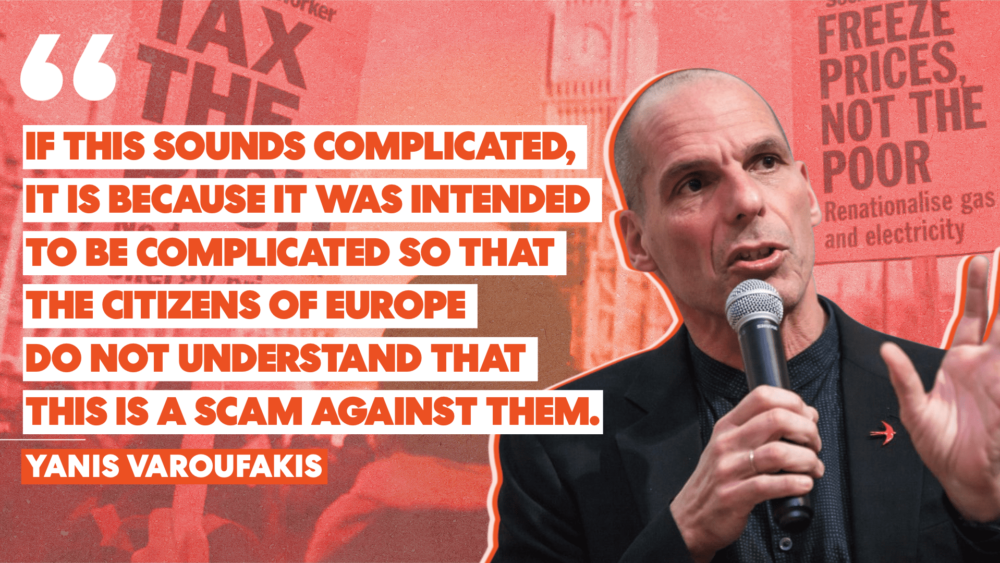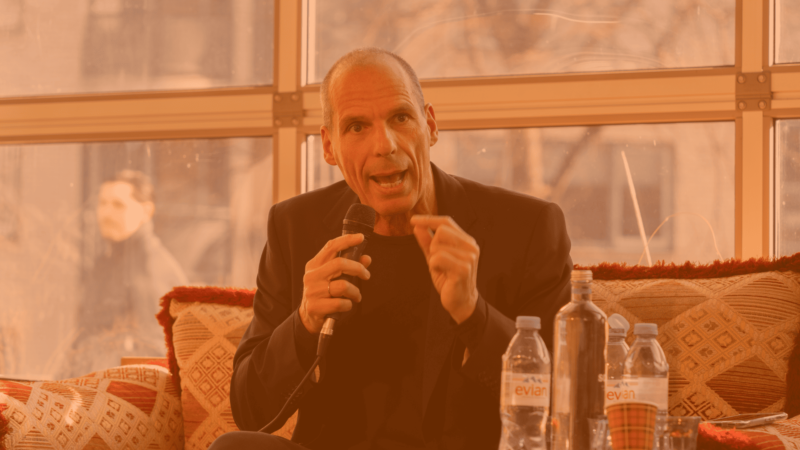“if this sounds complicated, it is because it was intended to be complicated so that the citizens of Europe do not understand that this is a scam against them.”
Amid a growing energy crisis, political leaders across Europe want to divert attention away from their own role in its exacerbation and instead make citizens focus on one thing only: Russia. However, it is far more complex than that.
During our recent panel discussion on the energy crisis, Yanis Varoufakis laid out the workings of the European energy market that exists today, one which has long been designed to favour the oligarchy above the people.
Varoufakis begins by explaining the Thatcherite model that subsequently extended to the rest of Europe, before outlining the corrupt practice of energy auctioning, followed by the Greek government scam that Ursula von der Leyen wants to implement across the continent, and ended by offering solutions to overhaul this injustice system.
The United Kingdom case
“If you really want an indication of what the matter is besides the fact that prices are going up, that there’s a war in Ukraine, supply chains have been interrupted… look at the United Kingdom. The United Kingdom is a very good case in point because it is self sufficient.
“More than 50% of Britain’s electricity needs are covered by wind power… producing electricity at zero marginal cost – just the cost of maintaining the windmills and nuclear. As for the gas reliance, which is around 35% of British electricity, UK electricity is produced using natural gas. All of it comes from the North Sea, more or less.
“So in other words, the UK doesn’t need Russian gas, doesn’t need Texan LNG, it doesn’t need to import anything. And yet you’ll see that the new Thatcher look-alike, prime minister Liz Truss, is promising to do something to cap the cost of electricity. Now, why is the cost of electricity in the UK rising as fast as it is rising here in Greece where we have no natural gas that we produce or Italy for that matter?
“The reason is Thatcher – because Thatcher privatised the electricity system in the UK and introduced the idea that privatisation is a good thing for the people – not for the oligarchs, but for the people, the idea being that the market knows better how to reduce costs than the state – state bureaucracies, state owned and run electricity grids and power stations are stuck at high costs. Better betting on looking after the workers more than looking after the customers, the electricity consumers – that was the line. And privatisation in the United Kingdom is crucial because the model of the United Kingdom was then extended to the rest of the European Union.”
How the Thatcherite energy system works
“The first step was to say: ‘Okay, what’s your price now? How much are you paying for your electricity? You pay 50 pounds per – I don’t know how many – kilowatt hours? Okay, fine, we are going to cap it. We’re not going to allow the price to go beyond what you’re paying and then we’re going to privatise and we will allow competition to bring it down. So you’ve got nothing to lose, you only have things to gain.’
“That was a very powerful argument. If you add to that the fact that they were giving away shares to the people who then of course sold them to the oligarchs, it was impossible to stop privatisation of gas initially and then electricity.
“The second phase was to say: ‘But who am I, as a politician to be deciding what a cap of the prices would be?’ Why should politicians decide that? Let the market do it? So that’s phase two, the more toxic phase of privatisation which is responsible for the fact that we are going to have bouts of energy poverty, and more general poverty in Europe.
“The second phase was to say: instead of having ministers or bureaucrats deciding the maximum price, what we’re going do is we are going to simulate a market. We can’t have a market when it comes to electricity. We need to simulate, to pretend to have a market.
“Privatisation in the United Kingdom is crucial because the model of the United Kingdom was then extended to the rest of the European Union.”
“Why can’t we have a market when it comes to electricity? Well, the only way we could have a market of electricity is, imagine if there were 30 or 50 different cables, electrical cables coming into your home and you could choose which one you’re going to take your electricity from, then it would be a market. Then it would be some kind of competition between different providers. But of course it would be stupid to have 50 grids going through every house and every state in every country. So there’s one.
“So they simulate the market, and how do they do that? They say: ‘Ok, we’re going to split electricity, the electricity company that used to be the state owned electricity company. We’re going split it in at least three parts.’
“First will be power generation. Each one of them (coal, gas, solar etc) becomes a company or is owned by some company that may own more than one.
“And these companies compete with one another in the wholesale market. So they compete to provide the system, with a wholesale price. That’s one part.
“The second part is the network, the grid, that belongs to another company. And then there is the part where electricity leaves the grid to go into your home.
“And that’s where you create 10, 5, 8, 20 electricity providers, who compete with one another in the market of buying the electricity from the grid, which has been bought from the producers and then selling it to us consumers, firms and households, competing with one another.
“So you simulate competition between the producers. The idea there is to allow competition to shrink the distance between the wholesale price and the retail price. That was phase two privatisation. And this is what is now prevailing in Europe, in the European Union. They copied the Thatcherite phase two model.
“Now, when you simulate a market – because it’s not a real market, it’s a pretend market – you need to have certain government imposed rules simply because you don’t have a real market, you have a government simulating a market.
“So the EU has agreed on their intergovernmental decisions – effectively France and Germany agreeing it amongst themselves – and then imposed it on the rest of the European Union.”
Explaining the corrupt EU energy market auctions
“Now, if this sounds complicated, it is because it was intended to be complicated.”
“Let me give you an example of what these rules are. So today there was an auction in the Netherlands. The producers supposedly bid amongst themselves about who’s going to provide the system, but the interesting thing is that it is exactly the opposite of what common sense would tell you should happen when it comes to a proper auction.
“You would expect that the company or the person offering the lowest price wins, right? No, in this market, the company offering the highest price wins, and then the price is the same for everybody, as long as the sum of the electricity that they have provided is no more than a certain amount, which is what the market demands – it’s madness. It’s called marginal cost price. And then supposedly the providers compete with one another to reduce the retail price to that maximum marginal wholesale price.
“Now, if this sounds complicated, it is because it was intended to be complicated so that the citizens of Europe do not understand that this is a scam against them, even during the good times.
“Proof of this is that, since privatisation, the difference between the cost of producing an average kilowatt hour and the retail price has trebled, so don’t believe anyone who tells you that the problem has nothing to do with the system and that the problem is that the cost of production is going up.
“Yes, the cost of production is going up because the price of natural gas is going up, but the war in Ukraine does not explain why the profit margins of the firms are getting larger.”
Greek energy scam that is spreading across Europe
“Why should the rest of you [Europeans] care? Because Ursula von der Leyen announced that the Greek government’s scam will be Europeanised.”
“Yesterday, I spoke in the Greek parliament and I exposed a scam of the Greek government, a particularly odious scam. Under pressure from MeRA25, DiEM25’s electoral wing in Greece, the government made a move months after the pressure came from us.
“Back in March, we presented in parliament a proposal on how to shield consumers from skyrocketing prices. What we said was this: as the price of electricity produced from natural gas is skyrocketing because the price of natural gas is skyrocketing, it’s crazy that electricity coming out of solar panels, which costs nothing to produce, is being sold by the private company at the same price (per kilowatt hour) that it would’ve been had it been produced from the most expensive natural gas.
“It is mad. And you don’t need to subsidise electricity prices. All you need to do is to eliminate these super profits by those idiots. Actually they’re not idiots, they’re very smart. We are idiots.
“So we proposed something really very simple, that every kilowatt hour, the price of it should be set by the state equal to its average cost plus 5%. We’re saying, ‘okay, nobody should lose money. Even those capitalist entrepreneurs who are profiting – okay, don’t lose money’.
“If you do this and you sum up over all sources of power, of electrical power, we would’ve had back in March a reduction in the average price of electricity of more than 50%, without any subsidisation, without the state borrowing money without taxing people, without anything. All that would happen is the super profits of the firms with the lowest level of marginal cost would be eliminated by a price cap.
“Now between you and I, sometime in the middle of August, I was a little bit worried because the Greek government, it turned out, on the 6th of July, had legislated something that seemed very much like what we were proposing.
“And I was bit worried. I thought, oh my God, do I have to come out now and thank the government for doing the right thing? They introduced a maximum cap for electricity produced by hydro – low, solar – a little bit higher, [and] the same with wind power. And then for lignite and for natural gas, they had a formula which effectively gave the average cost of producing through lignite or through natural gas, plus a small percentage. It was perfect. I thought my God, our proposal has gone through, it’s been legislated.
“I was getting ready to stand in parliament and thank the government for doing the right thing until I discovered that it’s a complete and utter fraud.
“Why should the rest of you [Europeans] care? Ursula von der Leyen announced that the Greek government’s scam will be Europeanised. So, comrades in Germany and France, in Portugal, in Spain, expect the same scam to be coming your way immediately. The European Union council may be deciding to agree with what Von der Leyen said yesterday, which is a copy of what the Greek government is doing.
“Now, listen to what the Greek government is doing. The first inkling we had at MeRA25 that this is a scam is when it mentioned that the daily auction for the wholesale price continues. This stock exchange in which wholesale producers are competing with one another in an auction, continues.
“Now, the human mind cannot wrap itself around that. If you have a maximum price that is imposed by government on every different power station, why do you need the auction? Isn’t that the obvious question to ask? This is what they do.
“Remember, the price for every megawatt hour that the government imposed from hydro was 85 euros. I looked at what the auction yielded, the price – it was 700 [euros] during this period. The price cap was meant to be for those kilowatt hours produced by hydro works, it was meant to be 85 [euros], or 112 [euros] for some other ones.
“So this is how it works. The producer of that kilowatt hour or megawatt hour receives the 700 euros that has been determined by the auction in the Netherlands. But then they have to give back to the Greek state the difference between the 700 and the price cap of 112, which is 588. So they give it back to the government. So far you think it’s stupid, I mean, why do this, why don’t you just ask them to receive 112 instead of receiving 700 and then have to return the 588.
“So far, no scam, just stupidity, just bureaucracy. Well, here’s where this scam comes. The government does not take this money in order to give it to consumers. No, the government takes this money to give it to the retail companies. Now, if you look at almost every market in Europe, the same shareholder that owns the producer owns the retail company.
“So it is as if I have a company that is producing electricity and I have a company that is a retail company. So what the government does is let the pseudo-auction determine the price at 700, then they force me to return to the state from my left pocket, which is my pocket as a producer, 588 euros to the government, and the government puts it in my right pocket.
“Now is it any wonder that a consumer feels no relief? None. Zero. Then what the government does, to ‘help you’ dear consumer, [will] borrow money, add it to the government budget, to subsidise your electricity bill. In other words, to allow you to give the oligarchs the money in my pocket that the government has taken from one pocket and put it in another pocket.”
“Now, if this is not a scam, I do not know what the word scam means. This is the definition of a scam.
“This is happening in Greece, this has been happening since 6th of July, and now this is the proposal by the European Commission in all its glory and greatness for how we’re going to deal with [this crisis].
Complexity is in the interest of the oligarchy
“The government are agents of the oligarchy. They are crooks and they are thieves.”
“Why are they doing this? Because complexity is in the interest of the oligarchy. I just took 23 minutes to explain this to you. No media are going to give me 23 minutes in Greece to explain this to people out there. Nobody’s going to allow the people of France, the people of Portugal, the people Slovakia, 23 minutes in order to have somebody explain this to them. You get 20 seconds and then you are interrupted.
“And in the meantime, nobody can understand what’s going. People think ‘okay, they are imposing a price cap, they are subsidising the public, so the government is doing something’. No, the government’s doing nothing. The government are agents of the oligarchy. They are crooks and they are thieves.
“And this is a clear cut case of destroying the capacity of the majority of Europeans to make ends meet in the interest of an oligarchy combining two things: on the one hand, the market fundamentalism of Thatcher that creates the simulated market which has failed us, especially now that energy prices have gone up, with stateism – the state borrowing, increasing public debt, so that the state can subsidise the oligarchs, but not the consumers.
The solution?
“The only people who benefit from the sanctions on Russian gas and oil are the Russian oligarchs and the European oligarchs.”
“The only solution to this is the immediate abandonment of the market model – the closure of the auction house in the Netherlands.
“The first step is we need to have a proper price cap, both at the wholesale level and at the retailer [level], so that the price that people pay reflects average cost plus a small percentage, a little bit of profit, for whoever is running the show.
“That’s number one. End market fundamentalism, end the delusion of markets – blow up markets. There can be no market when it comes to electricity because there’s only one electricity cable coming out of your wall and there can be no market. When they try to create a simulated market with one cable coming out of the wall, they are scamming society.
“Point number two: We need an energy union, a green energy union. We can no longer sustain this fallacy of the market which allows the German government to have its own plans about the green transition, the Greek government its own plans…
“Nobody’s investing in green hydrogen properly. Nobody’s investing in solar panels and windmills that are actually owned by communities. They are doing everything for the oligarchs. So, the second plank of the DiEM25 policy, I think, should be one of a socialised green energy union incorporating within the system this network of green energy production and distribution with ownership rights at the municipal level, the regional level, socialised, overseen by citizen assemblies by juries of randomly selected citizens and so on and so forth.
“And the third thing that we must do, and I know that that sounds controversial, but it would be my proposal: End sanctions on Russian energy. The only people who benefit from the sanctions on Russian gas and oil are the Russian oligarchs and the European oligarchs.
“It is not helping Ukraine, it is not undermining Putin, it is enriching Putin and his oligarchs, it is enriching our own [European oligarchs], end the sanctions that are only in the interest of the united oligarchies of Russia, of Ukraine, of Germany, of Italy and of Greece. Thank you.”
Watch Yanis and the rest of the DiEM25 panel discuss the European energy crisis in full
Do you want to be informed of DiEM25's actions? Sign up here















